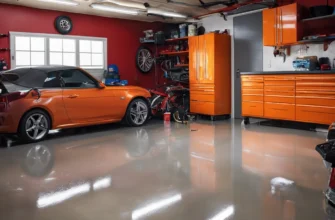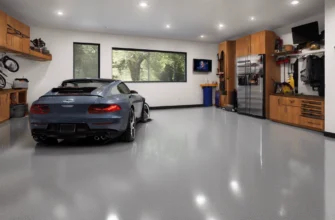- Introduction to Epoxy Flooring
- Durability and Resistance of Epoxy Flooring
- Comparing Cleaning Efforts: Epoxy vs Concrete and Tile
- The Non-slip Surface of Epoxy Flooring
- Seamless Finish: A Cleaning Advantage
- Eco-Friendly Options and Maintenance Products
- Long-Term Cost Efficiency of Epoxy Flooring Maintenance
- User Testimonials: Real Experiences with Epoxy Floors
- Conclusion: Making the Switch to Epoxy Flooring
Introduction to Epoxy Flooring
Epoxy flooring is a composite material primarily consisting of resin and hardener, which when combined, create a robust and durable surface ideal for various applications, particularly in residential garages. Unlike traditional flooring options such as concrete or tile, epoxy provides a seamless, glossy finish that enhances the aesthetic appeal of the space while offering considerable benefits in maintenance and durability.
One key difference between epoxy flooring and conventional flooring materials lies in the application process. Epoxy is typically applied in a liquid form, which allows it to adhere directly to the concrete substrate, forming a strong bond that results in a uniform surface. This contrasts with tiles, which require grout lines and joints that may trap dirt and grime, making cleaning more labor-intensive. Additionally, while concrete flooring is prone to cracking and damage from various environmental factors, epoxy flooring is resilient and can withstand heavy foot traffic, chemicals, and moisture.
The increasing popularity of epoxy flooring in garage spaces can be attributed to its low-maintenance nature. With a non-porous surface, epoxy is resistant to stains and spills, making it easier to maintain cleanliness without extensive effort. The absence of seams also reduces the likelihood of mold growth, a common concern with traditional flooring options. Furthermore, its versatility in color and finish allows homeowners to personalize their garage spaces, adding both style and functionality.
In light of these factors, epoxy flooring not only serves as a practical solution for homeowners seeking enhanced durability and ease of maintenance, but it also offers a visually appealing option that elevates the overall design of the garage area. Its advantages position epoxy as a favorable alternative to traditional flooring, particularly within environments that endure heavy use.
Durability and Resistance of Epoxy Flooring
Epoxy flooring is renowned for its impressive durability, making it an excellent choice for garage spaces that demand resilience and toughness. When installed properly, epoxy creates a robust surface that can withstand heavy loads, mechanical impact, and the rigors of everyday use. This high-performance flooring is resistant to scratches and dents, which is particularly beneficial in a garage environment where tools, equipment, and vehicles are frequently moved about. The protective layer of epoxy also helps prevent wear and tear that can occur over time, which elongates the lifespan of the flooring.
In addition to physical durability, epoxy flooring exhibits outstanding resistance to a variety of harmful substances that are often found in garages. Common chemicals such as oil, gasoline, and other automotive fluids can spill in this environment, but an epoxy-coated surface is designed to repel such stains effectively. This resistance minimizes the chances of permanent staining and allows for easy clean-up with simple detergents, further intensifying the low-maintenance appeal of epoxy flooring.
The combination of scratch resistance, stain repellent properties, and chemical resilience contributes significantly to the longevity of epoxy flooring. As a result, homeowners can spend less time and resources on maintenance and repairs, allowing for a more functional and aesthetically pleasing garage space. The surface’s ability to endure daily wear while maintaining its pristine appearance elevates the overall value of one’s property. For those seeking a garage solution that promises durability and reduces upkeep, epoxy flooring stands out as a superior option.
Comparing Cleaning Efforts: Epoxy vs Concrete and Tile
When considering flooring options for garages, the ease of cleaning is a significant factor. Epoxy flooring stands out when compared to traditional concrete and tile in terms of maintenance and hygiene. Epoxy surfaces are non-porous, making them resistant to stains, spills, and moisture. This is particularly beneficial in garage settings where oil, chemicals, and other liquids are commonly present. In contrast, concrete is porous and absorbent, which means spills can seep into the surface, leading to potential stains and the need for extensive cleaning efforts. Cleaning concrete often involves scrubbing with abrasive tools and strong chemicals, which can be time-consuming and labor-intensive.
Tile flooring, while offering some level of aesthetic appeal, also poses its challenges. Grout lines between tiles can collect dirt and grime, requiring more upkeep than the uniform surface of epoxy flooring. Regular sweeping and mopping can help maintain tile, but the presence of grout necessitates occasional deep cleaning to remove trapped debris. Unlike epoxy, tiles can crack or chip, which can complicate cleaning and maintenance as well.
Cleaning epoxy flooring is straightforward; regular sweeping or vacuuming, followed by mopping with a mild detergent and water solution will suffice in maintaining its pristine condition. For stubborn stains, a gentle scrub with non-abrasive tools is generally effective without causing damage to the surface. Moreover, products specifically designed for epoxy can enhance cleaning efficiency, as they help remove tough stains without harming the finish.
In conclusion, while concrete and tile flooring demand more intensive cleaning efforts due to their absorbent nature and irregular surfaces, epoxy flooring offers a low-maintenance solution that is both easy to clean and durable. These benefits make epoxy an advantageous choice for garage environments, reducing the overall time and resources required for upkeep.
The Non-slip Surface of Epoxy Flooring
Epoxy flooring presents an advantageous solution for garage environments, particularly due to its non-slip surface characteristics. One of the primary benefits of installing epoxy flooring is its inherent ability to minimize the risk of slips and falls, providing safety for both vehicles and individuals. The texture of epoxy surfaces can be tailored during the application process to enhance traction, making it an optimal choice for areas prone to spills or moisture, such as garages.
In addition to improving safety, the non-slip properties of epoxy flooring streamline maintenance efforts. Traditional flooring solutions may become slick when exposed to liquids, creating hazardous conditions and increasing the risk of accidents. In contrast, epoxy flooring retains its grip, allowing for safer movement even in adverse conditions. This is especially significant in a garage, where oil leaks, coolant spills, and water from washing vehicles can lead to dangerous surfaces.
The texture of epoxy can also serve as a barrier against the accumulation of dirt and debris. Spills are more manageable since the surface isn’t overly smooth, which typically allows liquids to pool. Instead, the non-slip nature of the epoxy flooring invites spills to spread, enabling easier cleanups with mops or an absorbent material. This not only reduces the time spent on maintenance but also retains the aesthetic appeal of the flooring as it resists staining and damage from harmful chemicals often found in garages.
In conclusion, the non-slip surface of epoxy flooring provides vital safety benefits while also enhancing ease of maintenance. This dual functionality makes it a favored option for garage spaces, effectively addressing potential hazards while simplifying the cleaning process. The combination of safety and easy upkeep underscores why epoxy flooring remains a leading choice for those looking to improve their garage environment.
Seamless Finish: A Cleaning Advantage
One of the most significant advantages of epoxy flooring in a garage setting is its seamless finish. Unlike traditional flooring options, which often incorporate tiles or other materials joined by grout lines, epoxy creates a continuous surface free from seams. This feature plays a crucial role in the overall cleanliness and maintenance of the area. Grout lines and seams are notorious for trapping dirt, grime, and debris, making cleaning a challenging task. In contrast, the solid surface of epoxy flooring allows for easy cleaning, reducing the time and effort required to maintain a spotless garage.
The absence of seams also contributes to a more hygienic environment. Areas where dirt can accumulate—like grout lines—tend to become breeding grounds for mold and mildew, especially where moisture is present. With epoxy flooring, the smooth surface eliminates these problem areas, significantly minimizing the potential for mold and mildew growth. This characteristic is particularly beneficial in garages, which are often subject to varying humidity levels and temperature fluctuations, creating an ideal environment for unwanted growth.
Moreover, cleaning epoxy flooring is a straightforward process. A simple sweep or vacuum can effectively remove loose debris, while a damp mop and mild detergent are typically sufficient for deeper cleaning. This streamlined maintenance routine is especially appealing for homeowners who prefer a low-maintenance option that does not compromise on cleanliness or aesthetic appeal.
In addition to the cleaning advantages, the seamless design of epoxy flooring contributes to its durability and longevity. The lack of joints and weak points enhances the structural integrity of the flooring, making it less susceptible to damage from tools, vehicles, and heavy equipment. In conclusion, the seamless finish of epoxy flooring not only elevates the overall appearance of the garage but also serves as an effective solution for a cleaner, more manageable space.
Eco-Friendly Options and Maintenance Products
Maintaining epoxy flooring in your garage can be an eco-conscious endeavor when you choose to utilize environmentally friendly cleaning options. A key aspect of sustaining the allure of your epoxy surfaces lies in employing non-toxic cleaning products. These products not only protect the integrity of the floor but also ensure a safe atmosphere within your garage.
One popular option is using a simple mixture of warm water and vinegar. This natural solution is effective in tackling dust, stains, and grime without harsh chemicals. The acetic acid in vinegar acts as a powerful cleaning agent while being safe for both the environment and your family. Additionally, baking soda can serve as a gentle abrasive cleaner when mixed with water, making it an excellent choice for scrubbing away tough stains without damaging the epoxy surface.
Another eco-friendly alternative is biodegradable soaps that are specifically designed for maintaining hard surfaces. These products are formulated to thoroughly clean without introducing harmful substances into your garage environment. Many brands now offer plant-based cleaners that are effective against oil and grease stains typically found in garages, all while remaining safe for your flooring and the ecosystem.
For those looking to streamline their cleaning routine, many manufacturers have started producing pre-mixed eco-friendly cleaners packaged in recycled materials. Such products not only emphasize sustainability through their ingredients but also support responsible disposal practices. Opting for these products can greatly reduce your carbon footprint while ensuring that your garage remains a clean and healthy space.
Incorporating these eco-friendly cleaning methods into your regular maintenance routine not only helps preserve the aesthetic appeal of your epoxy flooring but also promotes a sustainable way of living. Emphasizing non-toxic and biodegradable solutions fosters safer spaces for families while positively impacting the planet.
Long-Term Cost Efficiency of Epoxy Flooring Maintenance
When considering flooring options for your garage, the long-term cost efficiency of epoxy flooring is a significant factor. While the initial investment for epoxy flooring may be higher than traditional materials such as concrete or tile, the durability and low maintenance requirements ultimately lead to substantial savings over time. Unlike standard garage floors that may require frequent refinishing or replacement, epoxy surfaces are designed to withstand the rigors of daily use and can last for several decades with minimal upkeep.
The initial application of epoxy flooring involves a precise installation process, which typically demands a professional touch. This investment results in a highly resilient surface that resists stains, spills, and the wear and tear commonly associated with garage environments. Traditional concrete, on the other hand, often cracks and can be difficult to clean, leading to additional costs for repairs or replacements. Furthermore, concrete flooring can absorb oil and other liquids, necessitating regular cleaning solutions, which adds to long-term maintenance expenses.
Epoxy flooring also minimizes the need for frequent cleaning, as its smooth, non-porous surface prevents dirt and grime accumulation. This characteristic translates into significant reductions in cleaning supplies and labor costs over the years. In contrast, tile flooring, while aesthetically pleasing, often demands regular grout maintenance and can incur additional expense due to broken tiles needing replacement. The cost of maintaining epoxy flooring is largely confined to occasional mopping and inspections, making it an economically sound choice for homeowners.
In conclusion, the long-term cost efficiency of epoxy flooring maintenance cannot be overstated. By considering the initial investment alongside the reduced need for repairs and cleaning, one can clearly see how choosing epoxy flooring can lead to financial savings over time compared to more traditional flooring materials.
User Testimonials: Real Experiences with Epoxy Floors
Many homeowners who have opted for epoxy flooring in their garages have shared their transformative experiences, highlighting both the aesthetic appeal and practical benefits of this flooring option. For instance, John from Texas expressed his delight in how easy it has been to maintain his epoxy floor. He noted, “After installing epoxy, cleaning has become a breeze. A quick sweep and a mop with mild detergent are all it takes to keep it looking brand new.” John’s testimonial reflects a common sentiment; many users appreciate the minimal upkeep required for epoxy surfaces, which resist stains and spills better than conventional flooring.
Similarly, Sarah from California shared how her epoxy garage floor has enhanced the space’s durability. “I used to worry about oil spills from my car. Thanks to the epoxy coating, I’ve had no stains, and I simply wipe away any mess.” She emphasized that the non-porous nature of epoxy contributes significantly to its low-maintenance quality, allowing homeowners to spend less time worrying about maintenance issues and more time enjoying their garages.
Others, like Mike from Florida, focused on the longevity of their epoxy floors. He stated, “It’s been three years since I installed my epoxy flooring, and there’s no sign of wear. It’s held up against heavy traffic and even the occasional dropped tool.” This durability is a recurring theme in numerous testimonials, illustrating a shared experience of satisfaction with the resilience of epoxy garage flooring.
The consistency in these testimonials is evident; users widely appreciate the cleanliness, durability, and ease of maintenance that epoxy flooring brings to their garages. This flooring solution not only enriches the garage’s aesthetic appeal but also creates a more functional and durable space, benefitting users in ways they did not initially expect.
Conclusion: Making the Switch to Epoxy Flooring
In reflecting on the numerous advantages that epoxy flooring offers for garage spaces, it becomes evident that the transition to this flooring type can greatly enhance not only the aesthetics but also the maintenance of the area. One of the most striking benefits of epoxy flooring is its remarkable durability. Unlike traditional flooring options, epoxy stands up to heavy traffic, chemicals, and spills effectively, ensuring longevity. This resilience translates into fewer repairs and replacements, ultimately resulting in reduced costs over time.
Moreover, the low-maintenance nature of epoxy flooring is a significant draw for homeowners. Cleaning an epoxy floor is straightforward; it simply requires sweeping and occasional mopping. The seamless surface minimizes the risk of dirt accumulation in cracks and crevices, which is often a concern with concrete or tile options. The installation of epoxy flooring not only simplifies cleaning routines but also reduces the time and effort invested in maintaining the garage space.
Additionally, epoxy flooring is known for its excellent resistance to staining and fading, which helps maintain a fresh and vibrant appearance with minimal effort. With various design options available, homeowners can tailor their garage space to reflect personal style while enjoying the practicality that comes with epoxy finishes.
Given these compelling advantages, it is worth considering the switch to epoxy flooring. By opting for this low-maintenance solution, individuals can enhance both the functionality and visual appeal of their garages. This flooring choice not only conserves time and resources but also offers long-term investment benefits. In sum, epoxy flooring presents a viable upgrade for anyone seeking to simplify their garage upkeep without compromising on quality or aesthetics.








